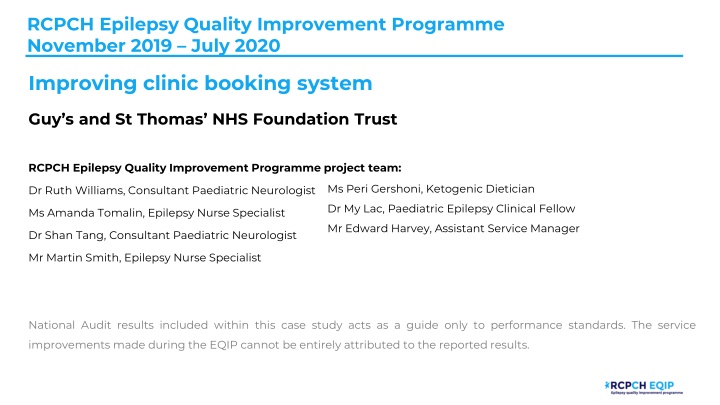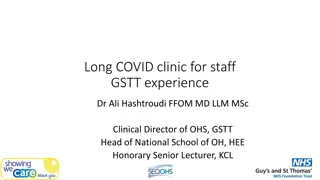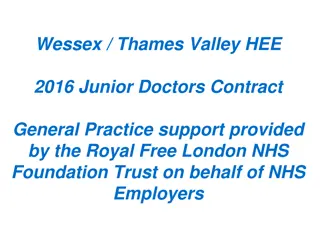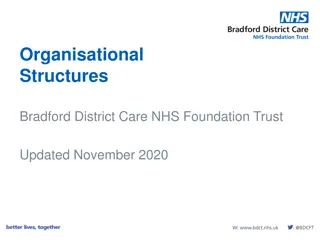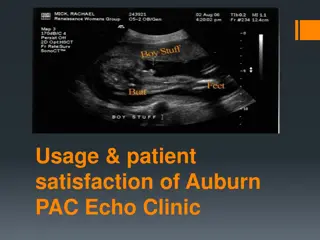Improving Clinic Booking System at Guys and St. Thomas NHS Foundation Trust
The RCPCH Epilepsy Quality Improvement Programme aimed to enhance the clinic booking system at Guys and St. Thomas NHS Foundation Trust. By implementing standard processes informed by patient feedback, the project strived to address inefficiencies, late cancellations, and underbooking in clinics. However, the initiative faced challenges due to the COVID-19 pandemic, necessitating a shift to virtual consultations. Surveys were conducted to gather patient and family feedback on the appropriateness of follow-up appointment intervals, with adjustments made considering the new virtual clinic setting.
Download Presentation

Please find below an Image/Link to download the presentation.
The content on the website is provided AS IS for your information and personal use only. It may not be sold, licensed, or shared on other websites without obtaining consent from the author.If you encounter any issues during the download, it is possible that the publisher has removed the file from their server.
You are allowed to download the files provided on this website for personal or commercial use, subject to the condition that they are used lawfully. All files are the property of their respective owners.
The content on the website is provided AS IS for your information and personal use only. It may not be sold, licensed, or shared on other websites without obtaining consent from the author.
E N D
Presentation Transcript
RCPCH Epilepsy Quality Improvement Programme November 2019 July 2020 Improving clinic booking system Guy s and St Thomas NHS Foundation Trust RCPCH Epilepsy Quality Improvement Programme project team: Ms Peri Gershoni, Ketogenic Dietician Dr Ruth Williams, Consultant Paediatric Neurologist Dr My Lac, Paediatric Epilepsy Clinical Fellow Ms Amanda Tomalin, Epilepsy Nurse Specialist Mr Edward Harvey, Assistant Service Manager Dr Shan Tang, Consultant Paediatric Neurologist Mr Martin Smith, Epilepsy Nurse Specialist National Audit results included within this case study acts as a guide only to performance standards. The service improvements made during the EQIP cannot be entirely attributed to the reported results.
Improving clinic booking system - Guys and St Thomas NHS Foundation Trust Project aim To obtain feedback from 50% of patient/families seen in tertiary epilepsy clinic regarding their perceived appropriateness of the time interval between follow up appointments by March 2020 . Background: There was a perception within the team that the current booking system was inefficient. Clinics were underbooked and encountered late cancellations. Parents/carers were contacting the hospital to chase appointments (as they were not being made within the correct time intervals). This project will provide baseline data to identify any current problems within clinic booking services and implement standardised processes for improvement. Additionally, the team plans to incorporate the views of the patient and parent/carer regarding the possibility of patient-led initiatives to improve follow-up appointments (time and date of next clinic appointment) and allow more patient involvement and increased flexibility. Area of focus Increase engagement with patients and families by collating feedback that will feed into identifying and mapping the current problems of the clinic booking service and making the necessary improvements when issuing follow-up appointments.
Improving clinic booking system - Guys and St Thomas NHS Foundation Trust Changes In March, due to the COVID-19 pandemic, all epilepsy clinic appointments were changed from in-person to virtual video clinics or telephone consultations. This impacted the dissemination and completion of feedback surveys. The team experienced new ways of working and training using virtual platforms in a digital environment for virtual consultations and team meetings (e.g. Attend Anywhere, Microsoft Teams, Blue Jeans, etc). Results Dec 19 - drafted a survey of 10 questions regarding the appropriateness of questions which were tested with two families. The survey was approved and distributed to patients and families that attended follow-up appointments for epilepsy clinics at the Evelina Children s Hospital (ELCH). The trial period was a two-week period: 22 January until 4 February. The number of surveys completed was 15. Surveys completed over a total seven-week period, offered face to face epilepsy clinic appointments at ELCH. Dates: Pilot 22 January until 4 February (n=15), 10th February until 15th March (n=31). Total number of surveys completed was 46.
Improving clinic booking system - Guys and St Thomas NHS Foundation Trust Process Map of the clinic booking system pathway pre-pandemic in detail:
Improving clinic booking system - Guys and St Thomas NHS Foundation Trust Process Map of the clinic booking system pathway post-pandemic in detail:
Improving clinic booking system - Guys and St Thomas NHS Foundation Trust The two-week trial period : 22 January until 4 February. The number of surveys completed was 15. The survey received a 100% response rate during the trial period, but it was not offered to all follow-up patients due to the survey being forgotten during busy clinics. The data was collected and analysed during the trial period, and the main findings revealed that patients and their families were generally satisfied with the clinic booking service, but that the majority of patients and their families did not receive enough notice before the clinic appointment. However, there was also a discrepancy in the method by which people were informed about their appointment (e.g., by letter, text, or phone call).
Improving clinic booking system - Guys and St Thomas NHS Foundation Trust Examples of April 2020 patient engagement survey results Q1-How much advance notice did you receive from us about your date of your clinic appointment? n=46 Q2-How were you informed about your appointment, by...? (n=46 but 65 answers) 45 52 Percentage % Percentage % 25 19 18 13 13 13 2 2 <1 WK 1 WK 1-2 WKS 2-3 WKS >3 WKS NO ANSWER LETTER TEXT PHONE IN PERSON Time Mode
Improving clinic booking system - Guys and St Thomas NHS Foundation Trust April 2020 Survey Results: Overall satisfaction with the clinic booking service was good - 84% very satisfied or satisfied. Q14-Overall how satisfied/dissatisfied are you with the current booking service? n=46 Causes of dissatisfaction: Difficulty contacting appointments team to chase and change appointments Not enough notice before clinic appointment (only 52% >3 week-notice before clinic date) 15% had to contact the hospital themselves 43 41 Percentage % The perceived appropriateness of the time interval between follow up appointments was reasonable, (80%) but there is room to improve. It showed that there are inconsistences in the way that patients and their families are informed of the appointment and re-confirming appointments. 9 2 4 It shows that some patient and families wish to have a personal choice when booking date/time of next appointment (58%) and wish to verbally agree and book provisionally next appointment with clinician in clinic (36%).
Improving clinic booking system - Guys and St Thomas NHS Foundation Trust Challenges Strategies were discussed as a team on how to increase engagement with the survey by mentioning it at the beginning of consultations, but it continued to remain a challenge. Patients and their families had a reluctance to attend hospital and A&E out of fear of contracting the Coronavirus. The teams EQIP champion was re-deployed from 30 March until 8 June to a different role (to cover acute service-Paediatric Specialities) which meant they were no longer working with the Complex Epilepsy Team during this time. Keeping open communication with the epilepsy team via virtual meetings became difficult due to changes in shift work patterns. Feb 20 - Due to the delays in preparing the survey, the data collection period was amended (initially was supposed to be January and February 2020) to a 6-week period extending until the 31st March. March 20 Unable to offer surveys in March because all face-to-face epilepsy clinics were replaced with telephone or virtual clinics due to the impact of the pandemic.
Improving clinic booking system - Guys and St Thomas NHS Foundation Trust Outcomes The results of the survey were shown to service managers, who informed the team that there is no official standard operating procedure (SOP) for the clinic booking process. The team was advised to continue to gather as much information about the current process from their clinic administrative team before supporting the implementation of a new pathway to address the issues identified from the survey results. The team experienced improved communication amongst the team through regular, short, but directed virtual meetings. Improved communication within neurosciences helped raise the epilepsy service profile within the Trust. Further discussion was required with managers and administrative staff to decide on how to implement specific interventions, which was delayed due to the pandemic. The team aims to provide patients and their families with increased notice before their appointment (> 3 weeks). The team also plans to standardise the methods of how appointments are confirmed and how patients and their families are informed.
Improving clinic booking system - Guys and St Thomas NHS Foundation Trust Lesson learnt There were more teaching and meeting opportunities made available using virtual platforms within the Trust, e.g., weekly neurology consultant teaching and journal club meetings. Outside the Trust e.g., London School of Paediatrics, BPNA webinars, virtual epilepsy surgery meetings at Great Ormond Street Hospital. Ability for more multi-disciplinary working, allowing the team to dip in and out of clinics and when patients were being seen. Epilepsy CNS were able to increase their attendance in clinics with different clinicians in a more purposeful manner (improved discussions with the lead consultant in the clinic). The team increased regular communication within the team and MDT discussions involving admins, managers, and neuroscience leads, which is important when planning service improvement. It is also important to have good clinical leadership within the team and for all team members to embrace flexible working. Visual presentation of team project intervention Team poster
https://eqip.rcpch.ac.uk eqip@rcpch.ac.uk @RCPCHEQIP
